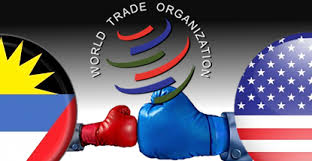
He had no indication that U.S. President-elect Donald Trump wanted to withdraw the United States from the World Trade Organization, said the chief of the global trading body, Roberto Azevedo on Thursday.
"I think that at this point in time what we have to do is be ready for a conversation," Azevedo told reporters. A very important partner in the revival of global trade is the United States and he is was convinced about this, he added.
If the rules of the WTO stopped him renegotiating U.S. terms of trade to his satisfaction, he could pull the United States out of e global trading body, Trump had suggested during his election campaign.
"I haven’t had any indication from anybody that that would be the case," said Azevedo. The chief of the organization added that he was ready to talk to Trump even though he had not yet talked to him.
He said that the WTO would continue doing what it does even if the United States were to pull out of regional trade deals.
Azevedo said that since much depended on what might be put in their place, and regional trade arrangements often failed or were renegotiated, free trade would not necessarily be damaged if the United States withdrew from existing or new regional trade deals such as the North American Free Trade Agreement or the Trans-Pacific Partnership (TPP).
"Trade is not for amateurs. Trade is tough. So we should not prejudge and jump to conclusions whenever any initiative is launched," he said.
Even though s Trump appears to be treading more softly in other policy areas after months of combative campaign rhetoric, the U.S. President elect has repeatedly said that he plans to kill the TPP, an ambitious Asia-Pacific trade pact, on his first day in office.
Azevedo said that he would wait for Trump's team to announce its strategy before evaluating it and added that every country had concerns about particular aspects of trade policies and trade deals.
"I haven’t heard, at this point in time, anybody say trade is bad for the United States," he said.
Trade liberalization is often blamed in the United States for jobs and investment moving to Mexico or China and has long been a target of anti-globalization protests.
Azevedo said that due to the fact that 8 out of 10 job losses in advanced economies is due to domestic-led drives for innovation, automation and productivity, it would be very wrong to lay the blame for widespread unemployment on globalization and global trade and although it can be disruptive at times, it is beneficial on the overall.
"If you don’t have the right diagnosis you don’t have the right medicine. If the medicine is simply protectionism the outcome will be that you will harm the patient," he said, adding that protectionism would hit poorer sections of the population hardest.
(Source:www.reuters.com)
"I think that at this point in time what we have to do is be ready for a conversation," Azevedo told reporters. A very important partner in the revival of global trade is the United States and he is was convinced about this, he added.
If the rules of the WTO stopped him renegotiating U.S. terms of trade to his satisfaction, he could pull the United States out of e global trading body, Trump had suggested during his election campaign.
"I haven’t had any indication from anybody that that would be the case," said Azevedo. The chief of the organization added that he was ready to talk to Trump even though he had not yet talked to him.
He said that the WTO would continue doing what it does even if the United States were to pull out of regional trade deals.
Azevedo said that since much depended on what might be put in their place, and regional trade arrangements often failed or were renegotiated, free trade would not necessarily be damaged if the United States withdrew from existing or new regional trade deals such as the North American Free Trade Agreement or the Trans-Pacific Partnership (TPP).
"Trade is not for amateurs. Trade is tough. So we should not prejudge and jump to conclusions whenever any initiative is launched," he said.
Even though s Trump appears to be treading more softly in other policy areas after months of combative campaign rhetoric, the U.S. President elect has repeatedly said that he plans to kill the TPP, an ambitious Asia-Pacific trade pact, on his first day in office.
Azevedo said that he would wait for Trump's team to announce its strategy before evaluating it and added that every country had concerns about particular aspects of trade policies and trade deals.
"I haven’t heard, at this point in time, anybody say trade is bad for the United States," he said.
Trade liberalization is often blamed in the United States for jobs and investment moving to Mexico or China and has long been a target of anti-globalization protests.
Azevedo said that due to the fact that 8 out of 10 job losses in advanced economies is due to domestic-led drives for innovation, automation and productivity, it would be very wrong to lay the blame for widespread unemployment on globalization and global trade and although it can be disruptive at times, it is beneficial on the overall.
"If you don’t have the right diagnosis you don’t have the right medicine. If the medicine is simply protectionism the outcome will be that you will harm the patient," he said, adding that protectionism would hit poorer sections of the population hardest.
(Source:www.reuters.com)





